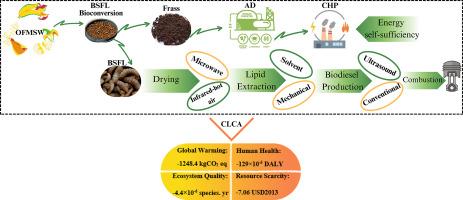Environmental sustainability assessment of a biorefinery platform utilizing black soldier Fly larvae for organic waste valorization
IF 9.6
1区 环境科学与生态学
Q1 ENVIRONMENTAL STUDIES
引用次数: 0
Abstract
The bioconversion of organic fraction of municipal solid waste (OFMSW) via black soldier fly larvae (BSFL) offers an efficient solution for sustainable waste management and energy challenges in emerging economies and low- and middle- income countries. In this context, the present study examines alternative biorefinery approaches to sustain biodiesel production along with animal feed from BSFL cultivated on OFMSW. These include different processes for larval drying (microwave and a combined infrared-hot air device), oil extraction (mechanical and solvent-based methods), and biodiesel production (conventional and ultrasound-assisted transesterification). Following the technical evaluation, a consequential life cycle assessment (CLCA) was conducted as early environmental sustainability guidance to examine the environmental performance of waste-to-biofuel scenarios. The system boundary was expanded to include the use phases via combustion of diesel-biodiesel blend as B20 blend. Anaerobic digestion (AD) and combined heat and power (CHP) system were applied across all scenarios to valorize the frass generated during BSFL rearing. The defatted protein-rich BSFL meal was processed and utilized as animal feed, while the digested frass was employed as organic fertilizer. The scenario with an infrared-hot air drier, solvent-based oil extraction, and ultrasound-assisted biodiesel production yielded optimal environmental outcomes, with avoided impacts across climate change, human health, ecosystem, and resource scarcity, measured as: −1248 kg CO2 eq, −0.0013 DALY, −4.45 × 10−6 species.yr, and − 7.06 USD2013 per tonne of OFMSW treated, respectively. The technology showed significant environmental benefits across most mid-point categories, with the greatest improvement in human non-carcinogenic toxicity (net value: −356.5 to −358.8 kg 1,4-DCB) due to landfill avoidance, except for terrestrial ecotoxicity, mainly driven by outdated, fuel-intensive transportation, which contributed 72 % of the induced impacts in this category. Moreover, compared to other biodiesel feedstocks like waste cooking oil, rapeseed oil and soybean oil, BSFL lipid, demonstrated superior performance across environmental impact categories, establishing them as a more sustainable feedstock alternative for biodiesel production.

利用黑虻幼虫进行有机废物增值的生物精炼平台的环境可持续性评估
通过黑虻幼虫(BSFL)对城市固体废物(OFMSW)有机部分进行生物转化,为新兴经济体和中低收入国家的可持续废物管理和能源挑战提供了有效的解决方案。在此背景下,本研究探讨了可替代的生物炼制方法,以维持生物柴油的生产以及在OFMSW上培养的BSFL的动物饲料。这些包括不同的幼虫干燥过程(微波和联合红外热空气装置),油提取(机械和基于溶剂的方法)和生物柴油生产(传统和超声波辅助酯交换)。在技术评估之后,进行了相应的生命周期评估(CLCA),作为早期环境可持续性指导,以审查废物转化为生物燃料方案的环境绩效。系统边界扩展到包括通过燃烧柴油-生物柴油混合物作为B20混合物的使用阶段。在所有情况下,采用厌氧消化(AD)和热电联产(CHP)系统来评估BSFL饲养过程中产生的杂草。将富含脱脂蛋白的BSFL粗粉加工利用为动物饲料,消化后的草渣作为有机肥。采用红外热空气干燥机、溶剂萃取油和超声波辅助生物柴油生产的方案产生了最佳的环境结果,避免了对气候变化、人类健康、生态系统和资源稀缺的影响,测量结果为:−1248 kg CO2当量,−0.0013 DALY,−4.45 × 10−6种。每吨处理的固体废物分别为- 7.06美元和- 2013美元。该技术在大多数中点类别中都显示出显著的环境效益,由于避免填埋,人类非致癌毒性(净值:- 356.5至- 358.8 kg 1,4- dcb)的改善最大,除了陆地生态毒性,主要由过时的燃料密集型运输驱动,在该类别中造成的影响中占72%。此外,与废食用油、菜籽油和大豆油等其他生物柴油原料相比,BSFL油脂在环境影响类别中表现出优越的性能,使其成为生物柴油生产的更可持续的原料替代品。
本文章由计算机程序翻译,如有差异,请以英文原文为准。
求助全文
约1分钟内获得全文
求助全文
来源期刊

Sustainable Production and Consumption
Environmental Science-Environmental Engineering
CiteScore
17.40
自引率
7.40%
发文量
389
审稿时长
13 days
期刊介绍:
Sustainable production and consumption refers to the production and utilization of goods and services in a way that benefits society, is economically viable, and has minimal environmental impact throughout its entire lifespan. Our journal is dedicated to publishing top-notch interdisciplinary research and practical studies in this emerging field. We take a distinctive approach by examining the interplay between technology, consumption patterns, and policy to identify sustainable solutions for both production and consumption systems.
 求助内容:
求助内容: 应助结果提醒方式:
应助结果提醒方式:


